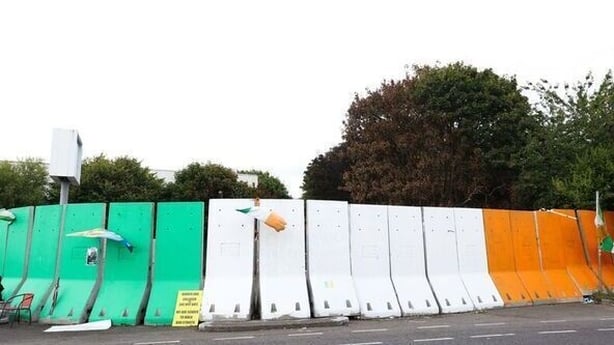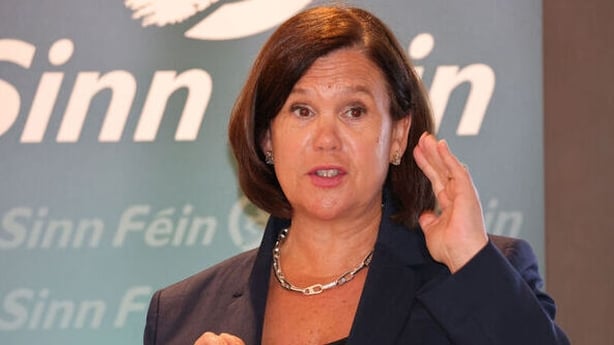After witnessing its long-time lead in the polls seemingly crumble, Sinn Féin is now pivoting to focus on one of the most sensitive and divisive of political issues - immigration.
Every party does it, with the need to get on top of a prevailing narrative and crucially to gain a foothold among potentially key voter demographics, never far from politicians' minds.
The difficulty with a political pivot though is that when the issue at play has far wider implications than mere positioning the change in tone risks being misinterpreted if the new message and the reasons for it are not kept clear and precise.
That is the dilemma currently facing Sinn Féin which, after witnessing its long-time lead in the polls seemingly crumble just when the general election is in sight, is now pivoting to focus on immigration.
In the past fortnight, the party has said it "lost the trust" of voters and has diverged from "where most people are" on immigration.
It has published an open letter to Taoiseach Simon Harris calling for Government "engagement" with local groups in Coolock over plans for an international protection applicant centre at the former Crown Paints Factory site.
It has launched a new policy document on the asylum seeker system, which includes plans for no IPAS centres to be placed in working-class areas, a call which has divided public opinion.
Earlier this week, its own party leader Mary Lou McDonald, who has made an increasing number of appearances on the issue since last month's local and European elections, was involved in a tense exchange with RTÉ's Philip Boucher Hayes during a radio interview solely focused on the topic.
Listen to Mary Lou McDonald's interview with Philip Boucher Hayes
We need your consent to load this rte-player contentWe use rte-player to manage extra content that can set cookies on your device and collect data about your activity. Please review their details and accept them to load the content.Manage Preferences
Coupled with the fall in poll support and the widely held view that Sinn Féin failed to meet expectations in last month's local and European elections, for some political strategists it is clear why the party may see the growing immigration debate as a way to re-align itself with what it believes are the views of non-government voters.
However, unless that pivot is executed carefully, both supporters and opponents believe the party could end up solving one problem for itself while potentially creating many more.
Changing electoral climate
Sinn Féin's increased focus on the asylum seeker issue has been framed as a response to last month's local and European election results.
However, this is only half of a story which in truth began far earlier, and is wider than just one party.
Over the past year, polls have consistently shown that immigration has become an increasingly significant issue for voters, with an Irish Times/Ipsos Behaviour and Attitudes poll in May suggesting 63% of respondents wanted a more restricted asylum seeker policy, 15% a more open policy, and 16% that the current system is "just right".
The same poll also suggested that, at 29%, immigration was the policy most noticed by voters when raised by candidates, followed by housing at 19% and healthcare at 4%.
Whether that growing electoral relevance of the issue is a natural by-product of the existing asylum seeker system, or caused by the increased public and media debate surrounding it, is a legitimate question.
However, regardless of the reason, the situation has led to parties subtly changing tact on the issue, with a number of Fianna Fáil councillors nationwide questioning existing policy in the lead up to the local elections and Fine Gael's new leader, Taoiseach Simon Harris, saying recently that Ireland needs to mix "compassion" with a "rules-based approach".

Sinn Féin is of course no different in this regard and has had clear political, if not universally agreeable, reasons to try and shift its views on the issue.
While the party has consistently led almost every opinion poll since the 2020 general election, the past has seen its suggested poll support fall sharply from a record high of 36% in June 2022 to 23% in the latest Red C/Business Post poll last month.
That suggested the current support level is just 1% ahead of Fine Gael and a drop of 4% since the previous poll in April, with the fall reflected where it counts most, at the ballot box, too.
On paper, Sinn Féin's performance in last month's local and European elections does not sound as bad as the disaster some have sought to portray it as, with the party gaining 21 local authority seats and increasing its MEP seats from one to two.
However, it has not been lost on Sinn Féin officials, or their rivals, that those results are compared to a dismal performance in 2019 when the party lost almost half of its local election seats and two of its three MEP seats.
The 2024 results are also far down from what Sinn Féin would have reasonably expected to have achieved just a few months ago.
When seen in the context of small but significant anti-immigration voting patterns in constituencies previously considered fertile ground for Sinn Féin to grow, the inability of the party until now to set out a clear position on the asylum seeker system has been flagged as a deepening problem for it.
That view is again supported by May's Irish Times/Ipsos poll, which suggested that 44% of Sinn Féin voters surveyed would be likely to vote for a candidate who said they wanted a tougher asylum seeker system, compared to 32% of Fianna Fáil voters surveyed, 31% of Fine Gael voters, and less than half of Labour and Green Party voters, among others.
Coupled with the fact that the poll also suggested that 52% of people voting for Independents or smaller parties, a grouping which has taken votes from Sinn Féin in working-class areas, said they would be likely to vote in this way and the pragmatic reason for the recent Sinn Féin pivot is apparent.
The pivot
An acceptance of that changing situation has led to a toughening up of Sinn Féin's immigration and asylum seeker system policy, most evidently in the past fortnight.
In keeping with the party's approach to post-election analysis, two weeks ago Mary Lou McDonald attended a meeting of Sinn Féin's Ard Chomhairle to review the party's local and European election performance, rarely a good sign, before speaking with the waiting media.
"Learnings" is usually the polite way of putting it when things go wrong, Ms McDonald instead did not mince her words.
Asked about the poor results and if it had anything to do with the perception her party is unclear on its immigration policy, the Sinn Féin leader said bluntly that her party had "lost the trust" of voters and diverged from "where most people are" on the issue.
While stressing that Sinn Féin "stands firmly against racism", Ms McDonald said that "on the issue of immigration, we have failed to reflect where most people are at".
After saying that "everyone must be treated with respect, dignity and in accordance with human rights standards, this is not in dispute," she added that Ireland "must have an immigration policy that makes sense to people".
Days later, Ms McDonald again indicated a new approach to the debate, responding to the violence in Coolock over the plan for an international protection applicant centre at the former Crown Paints Factory in the area with an open letter to the Taoiseach calling for "engagement" between the Government and "concerned" groups.

Although condemning the violent scenes, the open letter urged the Taoiseach to take part in a "process of engagement and dialogue" with locals, saying it is not about "vetoes" but about "respect, resources and supports" - a view Ms McDonald repeated to RTÉ News that evening.
While that letter led to what the Taoiseach said in a statement was a collegial phone call between both politicians the following day, some in Government are understood to have taken a dim view of the suggestion discussions have not already taken place in recent months with people in the Coolock community, suggesting the facts were being re-framed for political reasons.
The issue was again back in the Sinn Féin spotlight earlier this week when the party published a new policy document on Tuesday on the international protection system called "A Fair System That Works".
The document again stressed that Sinn Féin is opposed to racism, before emphasising that the current asylum seeker system is "broken", that decisions on cases must be made quickly and that an "audit" of services must occur in areas earmarked for international protection centres.
While these points are to varying degrees increasingly common across the political spectrum, a final policy document point, namely that centres must not be built in "deprived communities that are already struggling", raised eyebrows.
A veto that some may interpret as pandering to protesters in Coolock and other areas, RTÉ's Philip Boucher Hayes put it to Ms McDonald in a heated radio interview the following day.
The Sinn Féin leader firmly rejected the claim, before doubling down on her party's new view that, in effect, asylum seekers should be placed in well-off areas rather than those they are currently in.
The new policy means the party is in reality gambling on shoring up its base in constituencies and electoral areas where it has traditional support, by reflecting the views the party believes are being expressed in these locations.
However, if not done carefully, that pivot, which until now was not on the party's agenda, also risks distancing Sinn Féin from middle-class area voter blocs it gained in the 2020 general election and votes it needs if it wants to be in power after the next vote now on the horizon.
What happens next?
Sinn Féin, of course, is not the only party which has moved towards a tougher asylum seeker system stance in recent months.
Fine Gael has made similar, although far from identical, remarks since the appointment of new leader Taoiseach Simon Harris in a bid to address public questions while carefully avoiding being seen to reverse too far.
Fianna Fáil, a party once infamous for its "broad church" approach to differing views, has seen a number of councillors express reservations about the existing system at that time too.
But, unlike those parties, Sinn Féin has the added dilemma of being in opposition, meaning anti-government voters insistent on quick change to a complicated and necessary system will look to it to hear concerns and to others with their own motives if they feel those concerns are being ignored.
For now, Sinn Féin appears to have taken the approach of trying to represent what it believes are legitimate questions from communities in its traditional working-class base and criticising the hard-right views of others involved, all while trying to keep the gains it has made in more affluent areas and among wider left-wing groups.
Responding to comments about the change in policy in recent days on an area not always known for its calm and nuanced approach to life - social media - Ms McDonald defended the new plan by saying it has "nothing to do with appeasing racists" and is instead about "listening, understanding, responding and leading".
Where that engagement, and the Sinn Féin immigration pivot, leads to will be watched closely by supporters and opponents as the general election inches ever closer.







